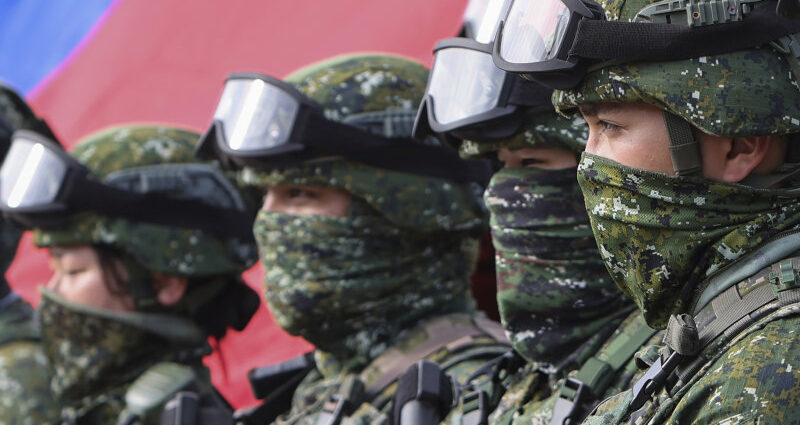Save articles for later
Add articles to your saved list and come back to them any time.
Prime Minister Anthony Albanese has just issued a warning to China over Taiwan. Delivering the keynote address at the Indo-Pacific’s most significant security conference the prime minister told delegates at the Shangri-La Dialogue in Singapore that taking Taiwan by force would unleash a conflict so serious it would “far outweigh any potential reward”.
Taiwan is our fifth largest export market. In the past year China has fired missiles into Taiwan and conducted naval and air exercises close to and all around the island. It has flown UAVs over Taiwan’s air territory and conducted invasion training off the Chinese mainland. Its diplomats regularly threaten any country that might offer support to Taiwan. It issued a white paper on Taiwan last year that said China wouldn’t renounce the use of force.
Taiwanese soldiers pose with a Taiwan flag after a preparedness enhancement drill in January simulating the defence against Beijing’s military intrusion.Credit: AP
Taiwan is critical strategic terrain. Chinese control over the 24 million free people of Taiwan would shift the strategic balance in Asia. It would break the so-called “first island chain” that constrains Chinese forces and would allow China to push out from there to move freely south to the Philippines, Malaysia and even to the Pacific Islands, with its new “bestie” in Solomon Islands. The fall of Taiwan would make life very difficult for Japan and South Korea. Taiwan is a great location for interdicting sea lanes through the South China Sea, through which much of Japan’s trade flows. The loss of Taiwan would shatter US strategic credibility. Many countries of the region would try to cut what deals they could with China.
The military forces Beijing is building are clearly designed for power projection beyond Taiwan. We should stop our constant dithering and do what we can to help Taiwan’s security in our own interest. How could an Australian-Taiwan security and defence relationship play out in the near term?
There’s plenty of potential without us dropping our formal position that we acknowledge, not endorse, the position of the Chinese government that Taiwan is a province of the PRC. We should exchange defence attaches for a start. Taiwan has defence attache posts located in more than 20 countries, including eight in Asia.
Our defence officials and military officers, who can now only fly over but not visit Taiwan, should hold meetings on various topics, such as intelligence sharing. Taiwanese military officers could attend our military staff colleges. Taiwanese national security personnel should be posted here and vice versa. We should encourage the US, Taiwan, and Japan to conduct exercises around humanitarian assistance and disaster relief, and Australia should be participating. Most of the skills exercised in these exercises are relevant for “normal” military operations, (except the shooting).
On broader national security issues, we should exchange information on foreign interference. Taiwan has been subject to a long campaign of public opinion warfare to weaken, confuse and demoralise its people to make conquest easier or have Taiwan give up without a fight. We have developed our own strategies to deter, counter and defeat Chinese information warfare that would form the basis of a useful exchange.
On national resilience, the Ukraine war has reminded us of the importance of the home front where we’ve seen the true grit of the Ukrainian people. Taiwan has a “porcupine” military strategy, involving all parts of Taiwan society in their defence. We know a lot here about disaster preparedness, response and recovery. Our new federal National Emergency Management Agency and state emergency managers would have much to share with Taiwan on resilience issues.
We should encourage exchanges between our think tanks and defence officials to tap into the knowledge Taiwan has on China, especially the People’s Liberation Army. We could encourage Taiwan-Australia defence industry links in areas like artificial intelligence, robotics, drones, cyber, and space. Our defence enterprises of all sizes would welcome Taiwanese investment. Members of parliament sitting on relevant defence and national security committees should visit Taiwan.
Just as important as supporting its military, we should offer Taiwan a free trade agreement to strengthen its economy and serve our trade interests. We started negotiations on an FTA with Taiwan eight years ago. But we withdrew from talks under pressure from China. We should also explicitly welcome Taiwan’s application to join the Comprehensive and Progressive Agreement for Trans-Pacific Partnership.
Naysayers will argue that China will just get angry with us if we pursue a closer security agenda. But if we’re worried about China’s aggressive behaviour then doing things that it objects to isn’t a justification for not doing things that need to be done. The argument that we shouldn’t rock the boat is worrisome. It suggests our support for Taiwan should be handcuffed by fear of what China might think.
Speaking at the Shangri-La Dialogue, Anthony Albanese said Australia’s goal was “not to prepare for war but to prevent it”. The more willing we are to support Taiwan’s security, the less likely it is we would ever need to fight for Taiwan.
Dr Anthony Bergin is senior fellow, Strategic Analysis Australia and expert associate at the National Security College.
The Opinion newsletter is a weekly wrap of views that will challenge, champion and inform your own. Sign up here.
Most Viewed in National
From our partners
Source: Read Full Article
-
Concerns over Queen’s ‘mobility issues’ as secret plans for new PM’s appointment
-
Cough syrup company boss jailed after 200 child deaths due to ‘toxic substance’
-
Denver man who killed woman over children playing in yard convicted
-
19 great Nelson Mandela quotes that helped change the world
-
Kate has become ‘stealthy powerhouse’ within the Royal Family, claims expert


